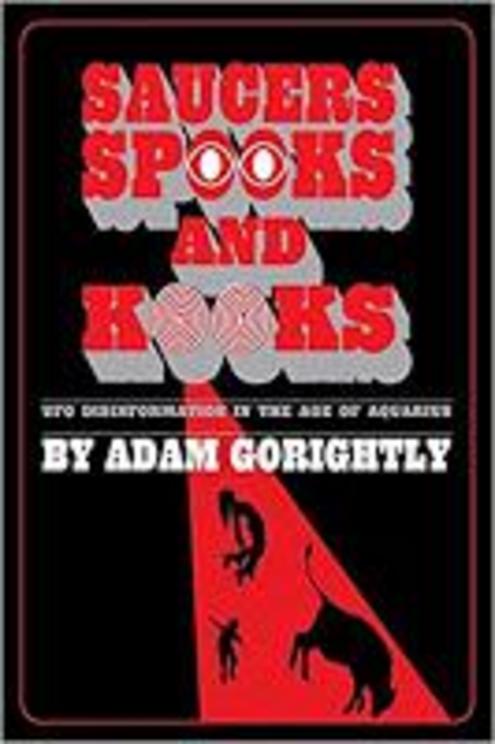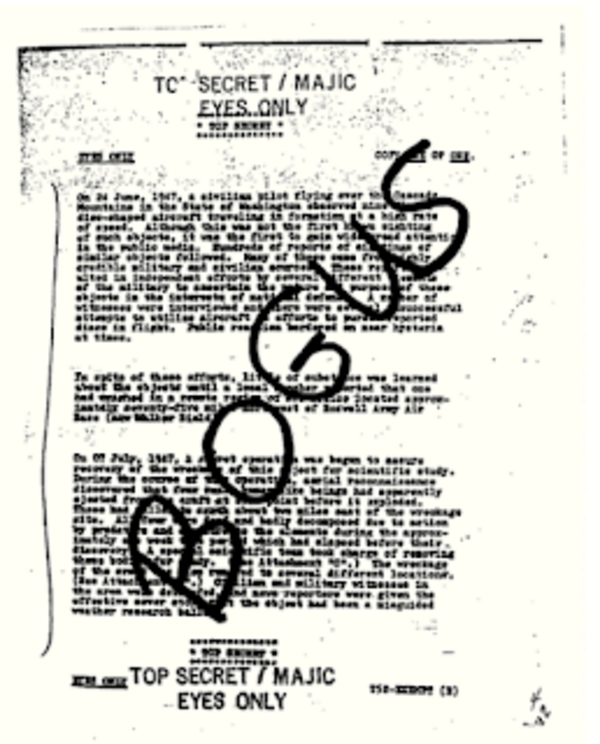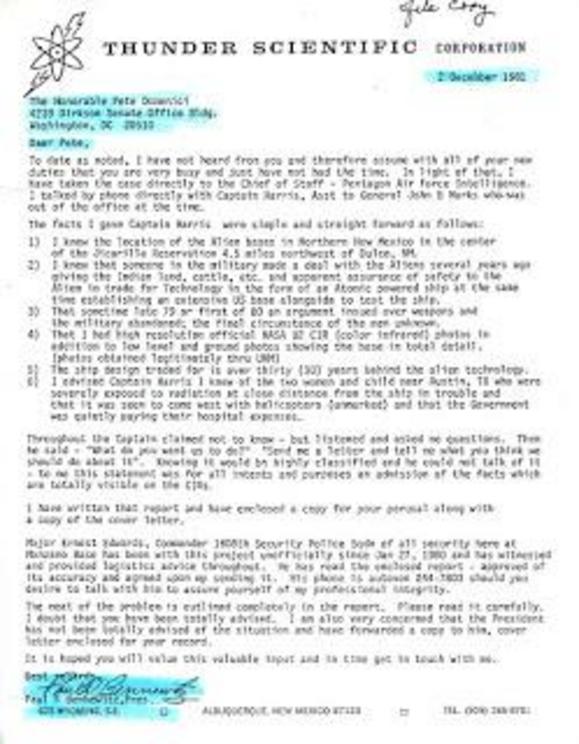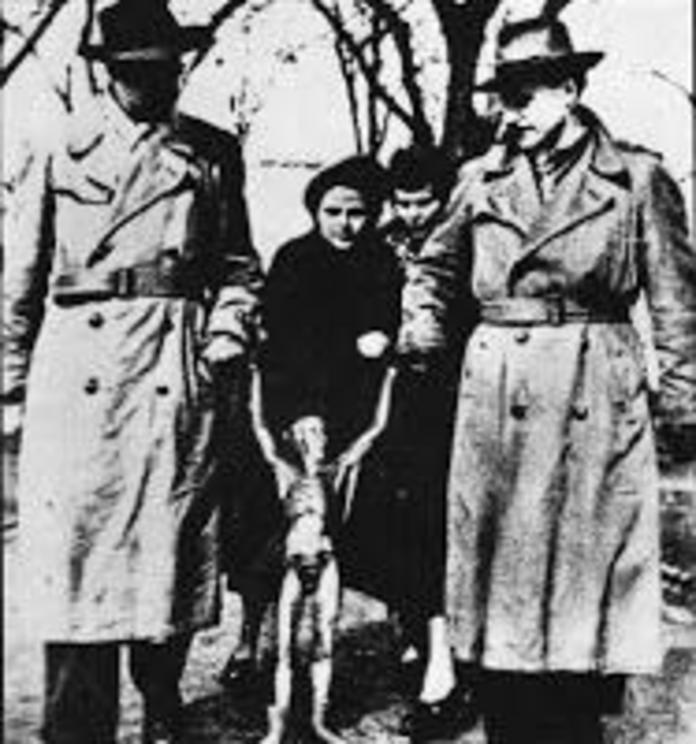Adam Gorightly discusses 'Saucers, Spooks and Kooks'
Adam Gorightly just released a brand new book, Saucers, Spooks and Kooks: UFO Disinformation in the Age of Aquarius. He is a longtime writer and researcher of UFO-related shenanigans, and I recommend giving a read to his latest offering from Daily Grail Publishing.
The book dives into the often dubious tales that make up the UFO genre, taking particular aim at the circumstances surrounding the alleged underground alien base of Dulce, New Mexico. Adam tracks the stories to their origins, and shares insights about his personal interactions with characters who inhabit and cultivate those tales.

I asked Adam if he would field a few questions for a blog post. My questions are followed by his responses below. He also provided the accompanying images.
What made you decide to write Saucers, Spooks and Kooks, and what was most important to you about it?
It was a project that evolved over time, starting with an article I was writing over ten years ago titled “My Breakfast with Tal”, which detailed my account of breaking bread with the one and only Tal Levesque. An enigmatic and somewhat shadowy character, he was a key player in promoting the Dulce Base story/mythos starting back in the late 1980s.
As things progressed, I started delving deeper into the many claims associated with Dulce Base, many of which Tal, and a handful of others, had seemingly seeded, and in some cases, it appeared, created out of whole cloth. Over time, the project evolved into a longer article with the working title “Deconstructing Dulce”. I set out to pick apart the entire Dulce Base story, in essence deconstructing all the elements, in an attempt to separate fact from fiction, and untangle the many seemingly spurious stories associated with Dulce. Many in ufology unfortunately have taken those stories as gospel over the ensuing years. So the article kept growing to the point where it ultimately became book length in order to cover all the aspects of the story, and the many players, in ufology and the intelligence community, who had helped form the Dulce Base narrative.
One of the key allegations in the Dulce Base story concerned a secret treaty between reptilian aliens and the US. Government in which ET technology had been exchanged in return for test subjects to be used in an alien-human hybrid breeding program. Rumors have long circulated that cattle mutilations were also somehow involved in these experiments, the ultimate goal of which was to allegedly create human-alien hybrids to preserve and revive a dying ET race.
As the story goes, a heroic security officer named Thomas Castello led a revolt against the Dulce Base alien bad guys and the end result was a shoot ‘em up that ultimately left sixty-six Dulce Base workers dead. Castello had at his disposal a “flash gun” that allowed him to take out a few of these dastardly aliens and hightail it out of Dulce, thereafter becoming a whistleblower on the run. This legendary battle, straight out of a sci fi B movie script, became known as “The Dulce War”.
In Saucers, Spooks and Kooks, you trace the origins of several urban myth-like beliefs to Paul Bennewitz and Myrna Hansen, and their fateful interactions of the 1980's. How much of what came to be popularly accepted about alleged aliens would you say is directly related to Hansen and her influence on Bennewitz?
Myrna Hansen was one of the first so-called alien abductees, way before the term became fashionable. Her encounter, or whatever you want to call it, occurred in early May of 1980, when she and her son Shawn, while driving in Eagle Nest, New Mexico, allegedly witnessed a cow get sucked up on a beam into a spaceship. Shortly after, they were also sucked up into the craft where all sorts of insanity ensued, first with the ETs dissecting the helpless heifer in front of their horrified eyes, and then Hansen was placed into a trance and underwent some sort of medical procedure.
Following her encounter, a terrified Hansen contacted the state police office in the town of Cimarron to inform them of her crazy encounter with knife wielding cow cutting aliens, and in turn the Cimarron office referred her to New Mexico state trooper Gabe Valdez. He worked out of Dulce, and had by this time acquired the reputation as the go-to guy for cut-up cows and unexplained lights in the sky. It was Valdez who put Hansen in touch with Paul Bennewitz, a private government contractor specializing in avionics who among other things was a MUFON member. Through Bennewitz’s MUFON connections he was able to enlist the services of Leo Sprinkle, a University of Wyoming professor who had been investigating UFO cases using hypnotic regression for over ten years. Sprinkle would conduct a number of hypnotic regressions with Hansen at Bennewitz’s home, and more specifically inside of Bennewitz’s Lincoln Town Car, which he had covered the windows with aluminum foil as a means to disrupt an alien beam he believed was attempting to interfere with Sprinkle’s hypnotic regression of Hansen.
Curiously enough, Sprinkle conducted hypnotic regressions back in 1973 with another lady named Judy Doraty, who recounted a similar tale as Hansen’s regarding ETs and cattle mutes getting sucked up into a space craft, so how much of this was crosspollination or contamination (i.e. investigators/regression therapists leading alleged witnesses to a certain conclusion) is still an open question. It should be noted that Bennewitz, in addition to his fascination with UFOs, also had an abiding interesting in the cattle mutilation phenomenon, and so the two—UFOs and cattle mutes, it could be presumed—became intertwined in his mind and this worldview leaked out on to those with whom he interacted.
Hansen’s regressions included a smorgasbord of standard alien abduction tropes, such as a victim being sucked up into a ship on a Star Trek styled tractor beam, then placed in a trance and undergoing medical procedures related to reproduction and the test tube creation of alien-human hybrids. Hansen, it was alleged, had been implanted with a monitoring device, a so-called “alien implant” as they became known in the lore, and she experienced “missing time.”
As the Sprinkle/Hansen regressions probed ever deeper into the recesses of her beleaguered brain, it was revealed, or she remembered or confabulated (take your pick), being transported to a secret underground facility. During a medical examination, a metallic object was allegedly implanted in the base of her skull, apparently as a means for the aliens to later track her and beam her with malevolent messages, which is the reason why Bennewitz went to all the trouble of constructing a tin foil beanie which he placed over the windows of his car during the hypnotic regression sessions.
At one point during her underground base misadventure, Hansen recalled escaping the clutches of her captors and encountering multiple vats of liquid containing the remains of human and animal body parts. Bennewitz somehow deduced that this underground facility where Hansen saw all this stuff was located near Dulce. All of these elements of the story ultimately became incorporated into UFO lore as we now know it. The term alien “greys,” as far as I have been able to glean, was another trope that came straight out of the Bennewitz Affair.
As you explained in the book, the Bennewitz Affair came to involve Richard Doty and William Moore. I particularly appreciated your documentation of the origins of the unreliable Majestic 12 documents and their relation to Moore and his associate, Jaime Shandera. What do you think is most important for people to understand about that chain of events?
One critical factor that’s important to consider when attempting to unravel the origins of the MJ-12 Papers was that in 1981, three years before the MJ-12 papers surfaced, Bill Moore was working on a book project with Bob Pratt, a National Enquirer reporter who covered the flying saucer beat for the magazine. This book project, originally titled MAJIK-12, was a fictionalized account based on supposedly true UFO related information relayed to them by none other than AFOSI special agent Richard Doty, who was identified by Moore in a draft version of this book as “Ronald L. Davis”. MAJIK-12, or alternately MJ-12, was short for Majestic 12, who as most of your readers probably know, was supposedly a super-secret government group involved in investigating UFO sightings and the retrieval of crashed flying saucers and aliens, dead and alive.
Although the Moore/Pratt book project ultimately fell by the wayside, the proposed title MAJIK-12 suggested that Bill Moore was aware of something called MAJIK-12 or Majestic-12 at least three years before a mysterious envelope landed on his research partner Jaime Shandera’s doorstep, sent anonymously with no return address, postmarked Albuquerque, New Mexico. This postmark seemed a huge hint to some that Richard Doty was behind this caper, as during that period Doty was stationed at Kirtland AFB in Albuquerque. The envelope contained a roll of 35mm film that when developed revealed photos of what became known as the MJ-12 papers.
Prior to the emergence of the MJ-12 papers, Moore and another research partner, Stan Friedman, speculated about the existence of just such a group as MJ-12, and had even compiled a list of its most probable candidates. Moore later shared these names with Doty in the hopes that he might be privy to information that would confirm their list of MJ-12 candidates. When the MJ-12 papers surfaced, they did indeed include on their roster some of these very same MJ-12 candidates that Moore and Friedman had previously speculated were members of the group, such as Roscoe Hillenkoetter, first director of the CIA (1947-1950), and James Forrestal, who was Secretary of Defense during that same period, thus seemingly providing confirmation to Moore and Friedman that they’d been on the right track. Others would suggest that Doty cooked up the whole caper, and through a feedback loop provided Moore, Shandera and Friedman with what exactly they were looking for regarding information that seemed to confirm the Roswell UFO crash, that just happened to be the subject of the book Bill Moore and Charles Berlitz published in 1979, The Roswell Incident. It has been conjectured that Moore had a hand in counterfeiting the documents, with or without the help of Doty. However, it’s never been conclusively proven who hoaxed the documents, although the FBI determined that they were not authentic, or in their words, “bogus.”

FBI conclusion of the MJ-12 docs: "bogus"
In the same manner that the MJ-12 docs mysteriously showed up on Shandera’s doorstep, a similar event occurred in 1994 when UFO researcher Don Berliner received an anonymously sent envelope that contained a roll of undeveloped 35mm film. Once developed, the photographs revealed a 29-page document called SOM 1-01, Majestic-12 Group Special Operations Manual, a purported military manual related to flying saucer crash retrievals.
SOM-01-1 also included a reference to “Kirtland Air Force Base, New Mexico” which some suspected was a wink and a nod that it may have been another Richard Doty snow-job. Nonetheless, SOM-01-1 has continued to be embraced by some of the more prominent voices in ufology, such as Linda Howe, who at the Citizens Hearing on Disclosure (a pretend Congressional hearing held at the National Press Club in 2013), claimed that SOM-01-1 had “stood the test of time” —which of course it had done nothing of the sort, and only added to the stack of other seemingly spurious MJ-12 related documents that have littered ufology over the years.
You wrote about several instances in which members of the military supply UFO researchers with doubtful information, accompanied by promises of future revelations. Ultimately, the big reveal does not materialize and the rug is pulled out from under the researcher. Please tell us a little about one such event.
In the early 1970s, film producer Robert Emenegger was on the business end of one such promised “big reveal” (that ultimately turned out to be a dud) when he and his co-producer/partner, Allan Sandler, were approached by U.S. Air Force officials with an offer to cooperate and share information for a proposed documentary on UFOs. According to their Air Force contacts, this would be an all hands on deck affair, with the support of each branch of the military who would provide Emenegger and Sandler access to UFO files in addition to the promised crown jewel: 16mm footage of a UFO landing with ETs, allegedly filmed at Holloman Air Force Base in 1971.
After spending considerable time and resources developing the project, with repeated promises of the saucer landing footage for their documentary, Emenegger and Sandler ultimately had the rug pulled out from under their feet, and were left empty handed as the Air Force failed to deliver the promised goods, and this early version of so-called “UFO Disclosure” went kaput. Emenegger and Sandler’s UFO documentary was eventually released years later, under the title of UFOs: It Has Begun but its impact was obviously diminished greatly from a credibility standpoint after the Air Force pulled out of the project. That's assuming, of course, that the Air Force actually possessed the material they promised for the film.
A similar “UFO Disclosure” head fake happened with Linda Moulton Howe a decade later, when in 1983 she was tapped to produce an HBO special with the proposed title UFOs: The E.T. Factor. During this period, Howe had been investigating the claims of Paul Bennewitz for possible inclusion in her documentary, and along the way she came to the attention of Richard Doty, then assigned to Kirtland Air Force Base. Doty took Howe under his dubious wing, and gave her a glimpse of some supposedly classified documents related to flying saucer crash retrievals and the astounding revelation that there was actually a little ET in captivity at a military base somewhere. Doty informed Howe if she played her cards right she might even have an opportunity to interview the little fella. In addition, Doty told Howe that government intelligence officers had in their possession film footage of a UFO landing at a military base, as well as other photos and classified materials she could use. After several months of stringing Howe along, Doty informed her that he’d been removed from the case, and passed her on to other intelligence contacts that likewise strung Howe along for a period of several months, but never produced the promised UFO footage. This delay eventually caused HBO to opt out of the project, leaving Howe dangling in the wind.
As for the main motivation behind these capers, one can speculate in a lot of different directions, one of which was that Doty was attempting to discredit and misguide Howe’s UFO research, and ultimately undermine her HBO documentary, as well as to find out what information she had on Bennewitz and the counterintelligence program aimed at him, of which Doty was an operative.
You explained a lot about the Dulce mythos and the people who spread it. In your research and experience, what did you think was most interesting about all that?
The evolution of the mythos, and how it came about in the first place, is what I find most intriguing. There are different elements to the story, including what has become known in UFO lore as “The Dulce War”, which I mentioned earlier, where supposedly this security guard at the base named Tom Castello helped form a resistance movement. Some of his fellow human co-workers then got themselves into a dust up with the aliens and came out on the losing end of the skirmish. When the dust had cleared, as the legend goes, sixty-six Dulce base workers perished, although Castello was able to escape on account of his trusty “flash gun.”
So where did this story come from? As far as I can tell, it originated in a December 2, 1981 letter that Paul Bennewitz sent to U.S. Senator for New Mexico Pete Domenici stating that “sometime late 79 or first of 80 an argument insued [sic] over weapons and the military abandoned [Dulce base]; the final circumstance of the men unknown…” In a September 11, 1984 interview, Bennewitz told UFO researcher Jim McCampbell that: “In 1979 something happened and the base was closed. There was an argument over weapons and our people were chased out, more than 100 people involved…” Although Bennewitz didn’t implicitly state that there was an actual battle between humans and aliens at Dulce, his comments about some type of conflict, or of the humans abandoning the base, appeared to have been enough to plant the seed that later blossomed into “The Dulce War.”

1981 letter from Bennewitz to Sen. Domenici
Nearly a decade later, “The Dulce War” story was fleshed out with the more detailed account concerning Tom Castello and his fellow resistors that appeared in “The Dulce Papers”. Variations of this story have also cropped up concerning a similar battle/confrontation occurring at Area 51.
In the mid-1990s, the Dulce War story resurfaced or was repurposed by a mentally unstable fellow named Phil Schneider who for a time became a star on the patriot and UFO lecture circuit, basically repeating the Tom Castello story with himself inserted into the heroic role of Castello, including the whole shoot ‘em up with dastardly aliens routine.
There seem to be a lot of common themes that run between each of these stories, such as Dulce, Area 51, SERPO, and events surrounding Paul Bennewitz. Please share some of your thoughts on that.
I would also add Roswell and the MJ-12 Papers to that mix, and the same recurring cast of characters who promoted these stories that are featured in my book, among them John Lear, Tal Levesque, Richard Doty, Bill Moore and a handful of others that formed this nexus of “influencers.” Bill Moore would later disavow many of these claims, and ostensibly remove himself from this nexus of characters, who he said were pushing false stories that had ultimately driven Paul Bennewitz bonkers.
John Lear, who admittedly had ties to the intelligence community, was an avid MJ-12 Papers promoter, while at the same time, during the mid-1980s, he was leaking information to the media about a secret stealth aircraft testing program at Area 51. The specter of stealth technology was forever lurking on the edges of these tall tales related to Dulce Base, Kirtland and Area 51, part of what appeared to be an effort to shape the overall narrative and muddy the waters about what was actually going on at these military testing sites.
As for SERPO, Richard Doty had a large role disseminating that story, dating back to when he appeared as “Falcon” in the nationally televised special that aired in 1988 called UFO Cover-up Live!. According to Doty (a la “Falcon”), the U.S. government had participated in an exchange program, with the aliens basically giving our astronauts the keys to one of their saucers, and having them travel to their planet, while in exchange the aliens stayed on Earth for a number of years sharing their vast intergalactic wisdom with the Earthlings, which was fundamentally the same story as SERPO.
What would you tell UFO researchers new to the fray who attempt to navigate these stormy seas?
Well, I think the people who need to hear it the most would probably care the least about what I have to say, but if they did, I’d suggest looking back in the annals of ufology and examining its past. Do that before jumping aboard any particular UFO shark, because there seems to be nothing new under the sun when it comes to a lot of these recurring themes that continually crop up in UFO lore.
Ufology has the tendency to retread and repurpose many of the same stories, or elements of the same stories, time and again. A perfect example of this is the so-called Silverman photo, which first surfaced in the German newspaper Neue Illustrierte on April 1, 1950, with the title "Der Mars-Mensch" which showed a strange looking three-foot tall fellow apparently from Mars. A few days later, Neue Illustrierte admitted that the Martian story was an April Fool’s hoax, but that didn’t stop the photo from spreading through the UFO subculture in the years to come.

The infamous Silverman photo
Saucer historian Isaac Koi has compiled a timeline of the Silverman photo and the publications in which it appeared. The first book to feature this photo was Major Donald Keyhoe’s Flying Saucers from Outer Space (1953), which made no mention of the Neue Illustrierte hoax, but claimed that the photo depicted U.S. government agents escorting an ET known as “Aluminum Man”, who was covered with an aluminum spacesuit that protected him from cosmic rays. In Space-Craft from Beyond Three Dimensions (1959), W. Gordon Allen referenced that the creature in the Silverman photo had crawled out of a crashed saucer near Mexico City.
Most recently, Harold Povenmire in UFO's and Alien Abduction Phenomena: A Scientific Analysis (2016) published a colorized version of the Silverman photo promoting it as the real deal, although what “scientific analysis” he conducted is unclear. Thanks to Povenmire, this new iteration of the Silverman photo soon began worming its way through social media, as a new generation of true believers clicked and shared to their heart’s content.
